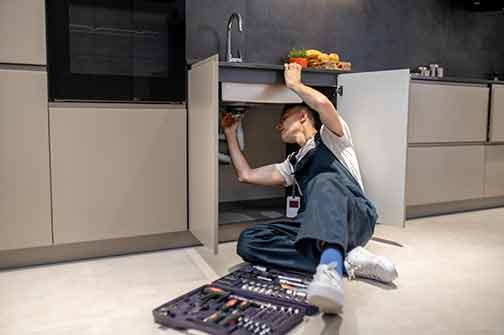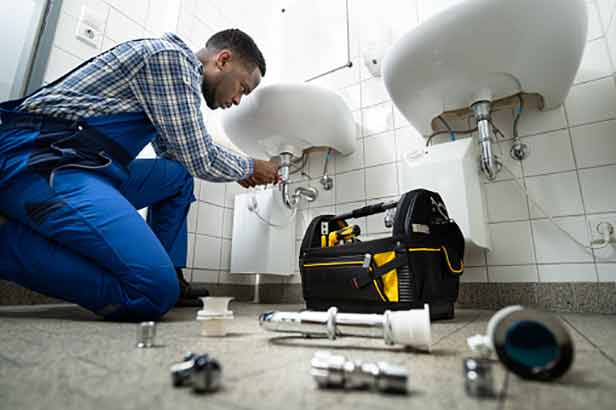
Choosing the right plumber can seem like a daunting task, especially when you’re facing a serious leak or a backed-up drain. It’s not just about who can get there the fastest or cheapest—it’s about who will do the best job. Ask a prospective plumber some vital questions to ensure you’re hiring the right professional.
Are You Licensed, Bonded, and Insured?
Firstly, ask a prospective plumber if they have a license. That is crucial. Consequently, licensed plumbers have undergone rigorous training and meet specific government-set standards, meaning they’re well-equipped to handle any plumbing issue. Furthermore, they adhere to local codes and regulations, eliminating legal worries.
Similarly, the plumber should be bonded and insured. That offers you protection if something goes wrong during the project. Thus, you need not bear any unexpected costs or damage to your property. Indeed, knowing you’re covered during the plumbing project provides peace of mind.
Ask a Prospective Plumber if They Can Provide References and Reviews?
Secondly, ask for references. Reviews and references from previous clients offer insight into a plumber’s work ethic, professionalism, and quality of work. Additionally, these testimonials often reveal how the plumber interacts with clients, which can be very telling.
Moreover, don’t overlook online reviews. Websites like Yelp, Google, and the Better Business Bureau often provide unbiased opinions about various services. However, exercise discernment when evaluating these reviews. Look for patterns in behavior, both positive and negative.
What Is Your Experience With My Specific Plumbing Issue?
Thirdly, inquire about their experience regarding your specific problem. For instance, if you need a drain cleaning service, you’ll want a plumber experienced with unclogging drains. Similarly, if you have trouble with your main water line, hiring someone with the right skills and equipment is crucial.
Further, ask about their expertise in residential vs. commercial plumbing. There are often differences in the systems and potential problems encountered. Also, consider any additional certifications or training the plumber may have, such as those related to green plumbing or high-efficiency appliances.
Do You Provide Written Estimates and Warranties?
Next, ask for a written estimate. That should include a breakdown of labor, materials, and other costs. Such transparency lets you compare different plumbers effectively and helps prevent surprise charges. Our consultants from a2bmovingandstorage.com will tell you how important written estimates are. Be sure to have proof on paper in such cases.
Equally important is asking about warranties. A plumber should stand by their work; a warranty offers protection if something fails after the repair. Understand the warranty terms, including its duration and what it specifically covers.
How Do You Handle Emergency Services and After-Hours Calls?
Lastly, plumbing issues often occur at the most inconvenient times. Therefore, it’s essential to understand how a prospective plumber handles emergency calls. Do they provide 24/7 service? How quickly can they typically arrive?
In addition, clarify their pricing structure for after-hour calls. While you may be willing to pay extra for an emergency, understanding these costs upfront can save you from a nasty surprise when the bill arrives.
The Differences Between Residential vs. Commercial Plumbing
Understanding the difference between residential and commercial plumbing is crucial. Residential plumbing often involves more fixtures and fittings than commercial plumbing, which tends to be more straightforward but on a larger scale. Commercial plumbers may also specialize in fire suppression systems or large boiler installations, which are less common in residential settings. When you ask prospective plumbers about their experience, consider whether their skills and background align with the plumbing work you need.
Moving & Plumbing
The above questions are crucial when you’re moving into a new home. Undoubtedly, you’ll want to ensure that the plumbing system is sound. Thus, one of the biggest challenges of moving to another state is finding a reliable plumber. While there are always some obstacles to overcome, especially when relocating, having a professional and trustworthy plumber can significantly ease your worries.
Preventive Measures for Plumbing
Prevention is better than cure, especially when it comes to plumbing issues. Regular inspections and timely maintenance can prevent a lot of common problems. For example, scheduling regular inspections can help avoid trouble with your main water line. It helps detect issues like root intrusion or pipe corrosion before they become major problems. The plumber you choose should be able to offer advice on preventive measures and maintenance schedules.
The Importance of Eco-friendly Plumbing
Eco-friendly plumbing is popular due to its environmental benefits and potential cost savings. Ask the plumber about their knowledge and practice of eco-friendly plumbing. It could include installing low-flow faucets and showerheads, high-efficiency appliances, or recommending energy-saving practices.
Dealing with Plumbing in Older Homes
If you live in an older home, plumbing can present unique challenges. Older homes often have outdated plumbing systems that may not comply with current codes. There could be trouble lurking behind the walls, like old, corroded pipes, or trouble with your main water line. Hiring a plumber with experience working with older plumbing systems is important and can handle potential issues without damaging the home’s structure.
The Role of Technology in Plumbing
The plumbing industry has not been left behind in embracing technology. Modern plumbers utilize technology to diagnose and repair plumbing problems more effectively. They can use cameras to inspect your main sewer line or hydro jetting for drain cleaning. Ask your prospective plumber about their technologies and how they can benefit your situation.
To Sum It Up
In conclusion, hiring the right plumber involves more than just picking the first name you come across. Always ask a prospective plumber the above questions to ensure you make an informed decision. Remember, a professional, experienced plumber can save you time, money, and a lot of hassle in the long run. By doing your homework, you can ensure a positive and stress-free plumbing experience.
